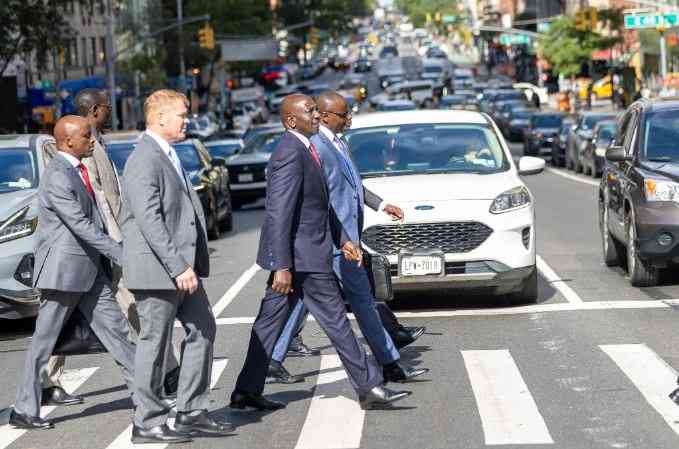Images of President William Ruto strolling the streets of New York on September 22, 2025, spoke louder than words.
With a lean delegation and just a handful of bodyguards, he crossed zebra crossings like any other pedestrian. Yellow cabs whizzed past, lights worked, and life moved in order. Nobody paused to cheer or take selfies. To New Yorkers, he was simply another passerby.
Back home, traffic lights are mere suggestions, routinely ignored by motorists. Matatus overlap lanes, boda bodas squeeze into impossible spaces, and pedestrians dart across roads with their hearts in their mouths. Police, who should instil order, often appear overwhelmed. The contrast is jarring.
One wonders what goes through the minds of our leaders when they travel abroad and witness systems that actually work for citizens: efficient transport, clean streets, functional governance. Do they simply admire the order, or do they think of replicating it at home?
Follow The Standard
channel
on WhatsApp
We’ve seen such walks before. On November 22, 2017, President Uhuru Kenyatta strolled from Harambee House to the Treasury. Nairobians scrambled for selfies and handshakes, a sharp contrast to New Yorkers barely glancing at Ruto. The difference? In developed nations, institutions matter more than individuals.
Consider Turkey’s Bosporus Bridge, built in 1973. At 1.5 km long, it links two continents and carries over 200,000 vehicles daily. Simply put, one can pee in Europe and take breakfast in Asia. Meanwhile, Kenya still struggles with the 500-metre Likoni crossing bridge—decades on.
In Nairobi, insecurity is a daily reality. Just last week, police arrested at least 300 suspects in a sweeping crackdown targeting muggings in the Central Business District (CBD).
Theft, in particular, has soared, with the CBD marked by daylight snatching and pickpocketing. Reports indicate that overall crimes have increased by over 51 per cent in a span of about 10 years.
This insecurity is attributed to factors such as economic inequality, lack of opportunity for youth, and a potentially ineffective justice system that struggles to ensure timely and consistent punishment for criminals.
Can President Ruto confidently walk along the streets of Nairobi—unguarded—and see for himself whether there is order like he witnessed in New York?
It is worth noting that our leaders have studied abroad, toured advanced economies, and seen what works. Yet, too often, they return home to preside over dysfunction. Isn’t it time they copied, not just admired, the working systems they encounter overseas?
Because Kenyans deserve more than photo opportunities. We deserve leaders who not only walk abroad but also walk among us—bringing back lessons that change lives at home. Until then, ordinary citizens will continue dodging potholes, reckless drivers, and muggers, while our leaders marvel at systems they refuse to build here.
Follow The Standard
channel
on WhatsApp
Images of President William Ruto strolling the streets of New York on September 22, 2025, spoke louder than words.
With a lean delegation and just a handful of bodyguards, he crossed zebra crossings like any other pedestrian. Yellow cabs whizzed past, lights worked, and life moved in order. Nobody paused to cheer or take selfies. To New Yorkers, he was simply another passerby.
One wonders what goes through the minds of our leaders when they travel abroad and witness systems that actually work for citizens: efficient transport, clean streets, functional governance. Do they simply admire the order, or do they think of replicating it at home?
Follow The Standard
channel
on WhatsApp
We’ve seen such walks before. On November 22, 2017, President Uhuru Kenyatta strolled from Harambee House to the Treasury. Nairobians scrambled for selfies and handshakes, a sharp contrast to New Yorkers barely glancing at Ruto. The difference? In developed nations, institutions matter more than individuals.
Consider Turkey’s Bosporus Bridge, built in 1973. At 1.5 km long, it links two continents and carries over 200,000 vehicles daily. Simply put, one can pee in Europe and take breakfast in Asia. Meanwhile, Kenya still struggles with the 500-metre Likoni crossing bridge—decades on.
In Nairobi, insecurity is a daily reality. Just last week, police arrested at least 300 suspects in a sweeping crackdown targeting muggings in the Central Business District (CBD).
Theft, in particular, has soared, with the CBD marked by daylight snatching and pickpocketing. Reports indicate that overall crimes have increased by over 51 per cent in a span of about 10 years.
This insecurity is attributed to factors such as economic inequality, lack of opportunity for youth, and a potentially ineffective justice system that struggles to ensure timely and consistent punishment for criminals.
Can President Ruto confidently walk along the streets of Nairobi—unguarded—and see for himself whether there is order like he witnessed in New York?
It is worth noting that our leaders have studied abroad, toured advanced economies, and seen what works. Yet, too often, they return home to preside over dysfunction. Isn’t it time they copied, not just admired, the working systems they encounter overseas?
Because Kenyans deserve more than photo opportunities. We deserve leaders who not only walk abroad but also walk among us—bringing back lessons that change lives at home. Until then, ordinary citizens will continue dodging potholes, reckless drivers, and muggers, while our leaders marvel at systems they refuse to build here.
Follow The Standard
channel
on WhatsApp
By Mate Tongola
